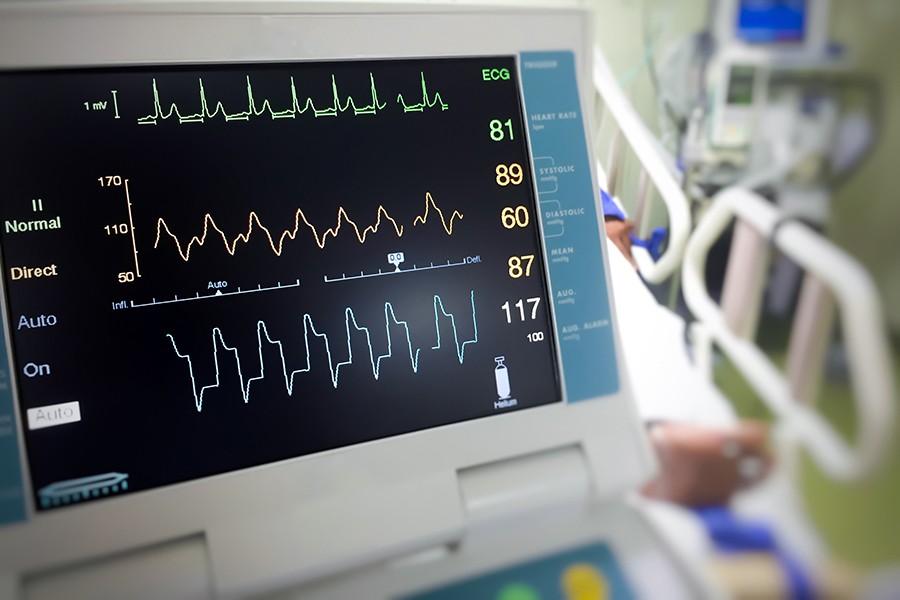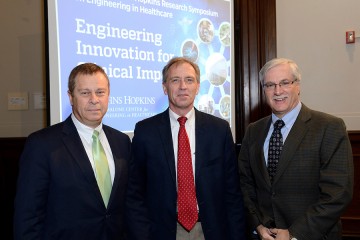When Greg Hager thinks about technology and its application in health care, he thinks about a busy emergency room.
Imagine it: physicians and nurses rushing, monitors beeping, alerts sounding, intercoms paging. In one bed, a patient is in cardiac arrest; in another, someone with the flu has a dangerously high fever. Outside, an ambulance pulls up.
For a care provider, at some point, distraction and irrelevant information has to be tuned out in order to focus on the task at hand. It may sound chaotic, but it doesn't have to be, he says.

Image caption: Gregory Hager
Hager, a professor of computer science and director of Johns Hopkins University's Malone Center for Engineering in Healthcare, says one possible solution to the problem of emergency room crowding is a system that understands the roles of different health care providers in the emergency department and monitors workflow. Such a system could consider how busy the department is overall and prioritize patients accordingly.
"The solution requires an understanding of not only how to go from data to decision, but it also requires an understanding of the impact of that decision," he says. "A well-engineered solution would help health care providers choose wisely and make decisions that will have the most impact on patient outcomes."
Today, the Malone Center joins the Armstrong Institute for Patient Safety and Quality in welcoming experts from engineering and the health sciences for a day-long symposium exploring technology's impact on health care delivery. Advance registration was required for the event, which takes place at the Sheikh Zayed Tower in East Baltimore.
The Hub caught up with Hager to discuss the current state—and the future—of that intersection.
What is the focus of this year's symposium?
The theme this year is "Teaming with Technology." New opportunities in data science and analytics have created the potential for new efficiencies and value, but if you look at the flipside of it, health care is about people taking care of people. So what we want to do is emphasize that it's not just about creating innovative new technologies—it's also about understanding how that technology is used by people, and how it affects them.
We want to explore that Human-Technology Frontier and understand how we can make technology innovations more effective. All of us are in this business to have an impact and to change the world for the better. The way we change the world is by understanding each other, understanding our problems and approaches, and driving solutions to be better engineered.
What are some of the projects coming out of the Malone Center that will change the way humans interact with technology in the realm of health care?
Here's a great example: we have a researcher, Scott Levin, who built an electronic triage system, which would address the issues we just discussed.
Before, there was a standardized approach to triaging patients into five different levels of urgency, and a majority of patients are dropped into the mid-acuity level. Those patients have an uncertain clinical course—and consume a lot of resources—because they're being examined and undergoing tests before we can decide what should be done to help treat them.
If you can more effectively take that population of patients in the middle and assess the urgency of their care, you can maintain a safer emergency department and save the hospital a lot of time and effort. And you can save the patient potential pain and suffering by making sure they're in the correct care pathway.
The e-triage system uses basic machine learning methods to look at data on patients coming into the emergency department and helps render a decision about where this patient should go. The neat thing about a system like that is that it not only analyzes the patient, but is adaptive to unique patient populations, departmental objectives, and care systems. It helps physicians prioritize their patients in the larger context and reduces crowding.
What about other forms of engineering, like software engineering or computer engineering—how do they factor into health care?
You might think of the health care record as a database, but that's far from how it actually works. Health care data is something like 80 percent unstructured, meaning it's actually a text input, or images. These types of data require a person looking at it and interpreting it, as opposed to a computer.
So one of the big opportunity spaces that we've seen is how can we start to take all of that unstructured data and structure it to improve patient care?
One example of a project that we aspire to is an idea by Jeff Siewerdsen, in biomedical engineering, that aims to improve spine surgery. It's a commonly performed surgery, but it has a high variability in outcomes. You get some patients who are pain-free afterwards, or you have patients whose pain returns after a few months or whose pain won't be addressed by surgery at all. We don't really understand what the differences are. The idea here is to take before and after images of patients, thousands and thousands of pairs of images, and from that, to extract the similarities and differences across patients and across surgeries to see if it relates to their outcomes.
With more precise evaluation of the data, we may be able to better target the right patient populations and the right surgery for them. The reason I'm excited about it is because this is something we couldn't have imagined doing five or 10 years ago—the level of techniques in analytics and computation that it takes to solve that problem is really new.
What does the future of engineering in health care look like to you?
I think it's natural to focus on acute care, meaning patients who are in the hospital, and that is our immediate focus. But if you think about health care in the future, I have to believe that it's going to be changed in the same way technology has changed other disciplines—it's going to spread out beyond the walls of the hospital.
Nowadays in computing we've pushed a lot of functionality to the edge—I'm talking to you on what is essentially a supercomputer right now, for example. I've got to believe that that's going to happen with health care, too. You're going to see people interacting every day with apps and devices and they're going to be part of their overall wellness and health care experience.
Posted in Health, Science+Technology, Voices+Opinion
Tagged malone center for engineering in healthcare, greg hager









